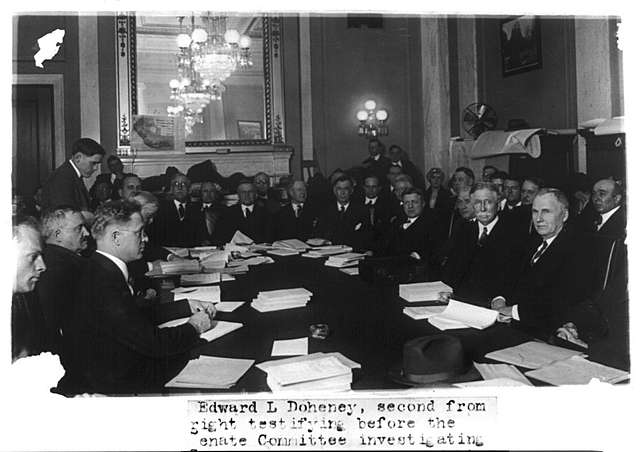Financial scandals have long plagued American politics, shaking public trust and highlighting the murky intersection between money and power. From slush funds to insider trading, these scandals often reveal the hidden workings of political figures who compromise their integrity for financial gain. While the specifics of each scandal differ, the overarching themes of greed and corruption are strikingly familiar. Today, let’s dive into ten of the most infamous financial scandals in American political history and explore how they unfolded.
1. The Teapot Dome Scandal: Oil Reserves and Secret Leases

The Teapot Dome Scandal in the 1920s was a significant event that rocked the Harding administration. It centered around the unauthorized leasing of Navy petroleum reserves at the Teapot Dome in Wyoming and two other locations. Secretary of the Interior Albert B. Fall was found guilty of accepting bribes from oil companies in exchange for favorable contracts. According to History.com, this scandal was a landmark in American political corruption, as Fall became the first sitting Cabinet member to be imprisoned. The exposure of this corruption led to a series of investigations, revealing a tangled web of deceit and backdoor dealings.
The Teapot Dome Scandal highlighted the need for government transparency and reform. It prompted the introduction of new regulations to prevent similar abuses of power in the future. The scandal served as a catalyst for change, emphasizing the importance of accountability and integrity in public office. Despite the resolutions, however, similar scandals have continued to emerge, reflecting the persistent challenges of managing ethical conduct in politics. This scandal remains a reminder of the potential for corruption when oversight is inadequate.
2. Watergate: The Break-In That Brought Down a President

Watergate is perhaps the most well-known political scandal in American history, culminating in the resignation of President Richard Nixon. What began as a break-in at the Democratic National Committee headquarters at the Watergate office complex swiftly unraveled into a broader conspiracy involving high-level government officials. As investigations unfolded, it was discovered that Nixon’s re-election committee was involved in this illegal espionage. The scandal exposed widespread abuses of power, including misuse of campaign funds and attempts to obstruct justice. According to The Washington Post, Watergate had a profound impact on American politics, leading to a significant shift in public trust.
As a result of Watergate, several government officials were convicted, and the scandal has had a lasting impact on political ethics and transparency. It led to reforms aimed at curbing corruption, such as the Ethics in Government Act and the creation of the Office of Government Ethics. The Watergate scandal underscored the importance of a free press and robust checks and balances in maintaining democratic integrity. Its legacy continues to influence American political culture, serving as a cautionary tale of the dangers of unchecked power. Even decades later, Watergate remains a defining moment that reshaped the landscape of American politics.
3. Enron: When Corporate Fraud Rocked Politics

While Enron is primarily remembered as a corporate scandal, it had substantial political implications, exposing the cozy relationships between politicians and big business. Enron, once a giant in the energy sector, was involved in pervasive accounting fraud that led to its dramatic collapse in 2001. The scandal uncovered extensive political contributions made by Enron to secure favorable legislation and regulatory decisions. According to PBS NewsHour, Enron’s political connections were deep, with ties to several prominent politicians in both parties. The fallout from the scandal tarnished the reputations of many and led to greater scrutiny of corporate influence in politics.
The Enron debacle prompted calls for increased transparency and accountability in both the corporate and political spheres. It led to the enactment of the Sarbanes-Oxley Act, designed to protect investors from corporate fraud and increase financial disclosures. The scandal highlighted the potential risks of allowing corporations to wield excessive influence over political processes. It served as a reminder of the importance of maintaining integrity and transparency in both business and government. The lessons from Enron continue to resonate as ongoing debates about corporate governance and political funding remain at the forefront.
4. Abscam: The FBI Sting Operation That Caught Congressmen Red-Handed

In the late 1970s and early 1980s, the Abscam scandal made headlines as an FBI sting operation exposed corruption among several members of Congress. The operation involved FBI agents posing as wealthy Arab businessmen offering bribes to politicians in exchange for political favors. The undercover operation resulted in the conviction of one senator and six members of the House of Representatives on charges of bribery and conspiracy. The scandal was unique in its execution, involving hidden cameras and recorded conversations that provided irrefutable evidence.
Abscam highlighted the vulnerabilities in the political system and the temptation of financial incentives. It brought to light the extent to which some politicians were willing to betray their public responsibilities for personal gain. The scandal prompted a reevaluation of ethical standards in Congress and led to the tightening of regulations regarding political conduct. While it was initially met with skepticism, Abscam ultimately reinforced the importance of oversight and accountability in government. Today, it serves as a reminder of the need for vigilance in safeguarding the integrity of democratic institutions.
5. The Keating Five: A Savings and Loan Scandal with Political Ties

The Keating Five scandal in the late 1980s was a significant political controversy involving five United States senators accused of improperly intervening on behalf of Charles Keating, chairman of the Lincoln Savings and Loan Association. The senators received substantial campaign contributions from Keating, which raised questions about their motives in supporting his failing institution. The scandal unfolded amid the savings and loan crisis, highlighting the potential for financial mismanagement and corruption. While only one senator faced formal penalties, the event damaged the reputations of all involved.
The Keating Five scandal underscored the importance of ethical conduct and the need to separate political influence from financial interests. It prompted discussions on campaign finance reform and the responsibilities of public officials in maintaining objectivity. Although the scandal did not lead to sweeping legislative changes, it emphasized the need for transparency and accountability in the interactions between politics and business. The lessons from the Keating Five continue to resonate, reminding us of the potential consequences of political and financial entanglements. This scandal remains an important chapter in understanding the complexities of political ethics.
6. Iran-Contra Affair: Secret Dealings and Financial Deception

The Iran-Contra affair in the 1980s was a political scandal that involved the secret sale of arms to Iran, in violation of an arms embargo, with proceeds being used to fund Contra rebels in Nicaragua. The scandal implicated high-ranking officials in the Reagan administration and exposed a covert operation that bypassed congressional oversight. The revelation of this clandestine operation led to a series of investigations and hearings, revealing a network of deception and financial improprieties. The affair highlighted the challenges of maintaining checks and balances in government operations.
Iran-Contra emphasized the dangers of circumventing established processes and the risks of unregulated financial transactions in political contexts. While several individuals were charged and convicted, many of the convictions were later overturned or pardoned, leading to debates on accountability. The scandal raised questions about executive power and the role of government accountability in foreign policy decisions. It remains a significant event in American political history, illustrating the potential for financial and political misconduct to intertwine. The lessons from Iran-Contra continue to inform discussions on transparency and oversight.
7. The Jack Abramoff Scandal: Lobbying and Financial Influence

The Jack Abramoff scandal in the early 2000s exposed the dark side of lobbying and its impact on American politics. Abramoff, a powerful lobbyist, was involved in a wide-ranging corruption scheme that included bribery, fraud, and the exploitation of Native American tribes. The scandal revealed how financial influence was used to manipulate legislation and political decisions. Several politicians and government officials were implicated, leading to a series of convictions and resignations.
The Abramoff scandal highlighted the need for lobbying reforms and brought attention to the ethical dilemmas faced by politicians in accepting financial contributions. It prompted legislative changes aimed at increasing transparency and regulating lobbying activities. The scandal underscored the importance of maintaining ethical standards and the potential consequences of unchecked financial influence in politics. It revealed the complex interplay between money, power, and decision-making, serving as a cautionary tale for future generations. The impact of the Abramoff scandal continues to influence discussions on lobbying and political ethics.
8. The HUD Scandal: Housing Grants and Political Favoritism

In the late 1980s, the Department of Housing and Urban Development (HUD) scandal exposed widespread corruption involving the allocation of housing grants. The scandal involved several high-ranking officials who were accused of accepting bribes and engaging in favoritism to direct federal funds to specific projects. The revelations of misconduct led to multiple convictions and highlighted the vulnerabilities in the federal grant allocation process. The HUD scandal emphasized the need for transparency and accountability in government agencies.
The scandal prompted reforms aimed at improving oversight and ensuring fair distribution of federal funds. It underscored the potential for political favoritism to undermine the integrity of government programs. The HUD scandal remains a significant event in understanding the challenges of managing public resources and maintaining ethical standards in governmental operations. It served as a reminder of the importance of vigilance and oversight in preventing abuses of power. The lessons from the HUD scandal continue to resonate in discussions on government accountability and transparency.
9. The Whitewater Controversy: Real Estate and Political Scrutiny

The Whitewater controversy in the 1990s was a complex political scandal involving real estate investments by Bill and Hillary Clinton and their associates. The controversy centered around the Whitewater Development Corporation, a failed real estate venture, and raised questions about financial dealings and political influence. The investigation into Whitewater led to a series of inquiries and was a significant focus during the Clinton presidency. While no direct evidence of wrongdoing by the Clintons was found, the scandal highlighted the potential for conflicts of interest.
Whitewater underscored the challenges of separating personal financial interests from public responsibilities for political figures. The controversy fueled partisan debates and became a focal point for critics of the Clinton administration. It emphasized the importance of transparency and the need for clear ethical guidelines for public officials. The Whitewater controversy remains a complex and often contentious chapter in American political history. Its legacy continues to influence discussions on political ethics and the scrutiny of public figures.
10. The Bernie Madoff Ponzi Scheme: Ripple Effects in Politics

While the Bernie Madoff Ponzi scheme was primarily a financial scandal, it had significant political implications due to Madoff’s connections and the regulatory failures it exposed. The scheme defrauded billions of dollars from investors and highlighted deficiencies in oversight by regulatory agencies. Madoff’s ties to prominent political figures and his involvement in political fundraising activities brought additional scrutiny to the scandal. The fallout from the scheme led to calls for reforms in financial regulation and increased accountability.
The Madoff scandal underscored the need for robust oversight and the challenges of detecting financial fraud. It prompted reforms aimed at improving regulatory frameworks and protecting investors from similar schemes. The scandal highlighted the potential for financial misconduct to impact political processes and emphasized the importance of maintaining transparency and accountability. The Madoff scheme remains a significant event in understanding the complexities of financial regulation and its intersection with politics. Its lessons continue to influence discussions on regulatory reform and ethical conduct.
This article is for informational purposes only and should not be construed as financial advice. Consult a financial professional before making investment or other financial decisions. The author and publisher make no warranties of any kind.








